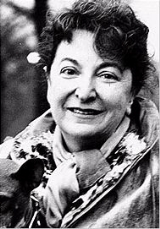
magazine from 1968 to 1991. Earlier in her career, her work appeared in City Lights
, McCall's
and The New Republic
.
Kael was known for her "witty, biting, highly opinionated, and sharply focused" reviews, her opinions often contrary to those of her contemporaries. She is often regarded as the most influential American film critic of her day.
She left a lasting impression on many major critics, including Armond White
, whose reviews are similarly non-conformist, and Roger Ebert
, who has said that Kael "had a more positive influence on the climate for film in America than any other single person over the last three decades." Owen Gleiberman
said she "was more than a great critic.
In the arts, the critic is the only independent source of information. The rest is advertising.![]()
I loved writing about things when I was excited about them. It's not fun writing about bad movies. I used to think it was bad for my skin. It's painful writing about the bad things in an art form, particularly when young kids are going to be enthusiastic about those things, because they haven't seen anything better, or anything different.![]()
The words "Kiss Kiss Bang Bang," which I saw on an Italian movie poster, are perhaps the briefest statement imaginable of the basic appeal of movies. This appeal is what attracts us, and ultimately what makes us despair when we begin to understand how seldom movies are more than this.![]()
Alienation is the most common state of the knowledgeable movie audience, and though it has the peculiar rewards of low connoisseurship, a miser’s delight in small favors, we long to be surprised out of it — not to suspension of disbelief nor to a Bertolt Brecht|Brechtian kind of alienation, but to pleasure, something a man can call good without self-disgust.
![]()

